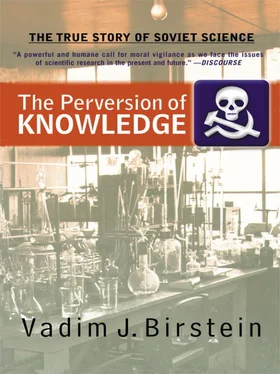Bondarenko “confessed” that he in fact “belonged to the anti-Soviet organization within the Agricultural Academy headed by Vavilov. However, he insisted that VAVILOV was especially hostile to scientists-Communists, considering them ignorant and [he] always preferred old specialists and those who had anti-Soviet views…” 167
According to the recollection of the artist Grigorii Fillipovsky in 1968, who was kept together with Vavilov in Cell 27 of Butyrka Prison in Moscow in June 1941, Vavilov’s physical condition after Khvat’s interrogations was terrifying:
Every night Vavilov was taken off for questioning. At dawn a warder would drag him back and throw him down at the cell door. Vavilov was no longer able to stand and had to crawl on all fours to his place on the bunk. Once there his neighbors would somehow remove his boots from his swollen feet and he would lie still on his back in his strange position for several hours. 168
On June 28, 1941, four more of Vavilov’s colleagues were arrested in Leningrad: cytologist, geneticist, and corresponding member of the academy Grigory Levitsky; head of the VIR Wheat Department Konstantin Flyaksberger; former deputy director of the VIR Nikolai Kovalev; and academician and head of the VIR Bureau of Herbs Aleksandr Maltsev. Copies of transcripts of Flyaksberger’s testimonies were included in the Vavilov case. 169Drs. Nina Bazilevskaya, Yevgeniya Sinskaya, and Maria Shebalina were driven out of the institute. 170The NKVD investigators used innocuous information received from Vavilov during long interrogations as the material for creating “cases” against his colleagues. Four pupils of Levitsky, famous specialists in different fields—Drs. Nikolai Avdulov (died in 1938 in a labor camp), Boris Vakar, Vladimir Chekhov, and Ya. Ellengor—had already been arrested by the NKVD. 171
On June 29, 1941, Khvat claimed materials taken during the search of Vavilov’s apartment—a photo of Aleksandr Kerensky, copies of letters defending Professor Ivan Makarov (arrested July 29, 1931) and Professor Sergei Sobolev (arrested April 9, 1934)—exposed his anti-Soviet activities. 172The investigation head, Schwartzman, approved.
Finally, on July 4, 1941, Vavilov signed a document entitled “My Attitude to Espionage Activity.” 173It is difficult to say which part of the document was written by Vavilov himself and which was prepared by Khvat. Definitely, Vavilov included the phrase that in Germany between 1930–1933 he met “the geneticist Timofeev-Ressovsky, who from 1926–1927 went to Germany to work at the Brain Institute [directed] by Dr. Vogt (who treated V. I. Lenin). He constantly renewed his Soviet passport and desired to go backto the USSR. I have informed the Presidium of the Academy about this…” (bold in the original). Insisting on Timofeev’s “desire to go back” to the Soviet Union, Vavilov tried to help him because obviously the NKGB considered Timofeev to be an anti-Soviet defector. But Khvat did not succeed in his main goal: Vavilov never admitted he was a spy. He only wrote that “unintentionally and without desire, in fact I helped spies to sneak into the USSR under the cover of scientists, and this way I helped their hostile spy activity, to which I plead guilty.”
The verdict prepared by Khvat, approved by Schwartzman, Vlodzimirsky, and First Deputy Commissar Serov, was dated the next day, July 5, 1941. 174Basically, it included all points of the arrest warrant. The same day, the head of the Medical Department of Lubyanka Prison inspected Vavilov and found that he had myocarditis. 175No wonder Vavilov developed heart problems after the investigation. Apparently, Khvat wanted to know whether Vavilov could physically withstand the accusation. The next day, on July 6, Khvat officially showed Vavilov the verdict.
The text of the verdict contains three notes by Vavilov after Khvat’s main statement. Vavilov definitely understood that Khvat falsified “testimonies” about his spy activity. Khvat included the notes (in brackets):
The defendant Vavilov N. I. … confirms his testimonies given during the investigation and declares that he had no political connections and even meetings with Bukharin except their mutual trip to England in 1931 to a congress on the history of science and techniques. [Testimonies of Tulaikov about this are not true. I reject testimonies of Avdulov N. P. and Savich about my espionage activity. I absolutely do not know Kuznetsov I. V. and Ushakova, who testified about my spy work.]
(Signature of the accused)
N. Vavilov 176
On July 8, 1941, the Military Collegium of the USSR Supreme Court decided to hear the Vavilov case “in a closed trial, without participation of the prosecution and defense.” 177A trial lasting only a few minutes took place on July 9, 1941. The collegium was chaired by Military Jurist Suslin and included Military Jurists Dmitriev and Klimin and Secretary Mazurov. Vavilov plead guilty of membership in the TKP before 1930. He strongly denied the accusations of espionage activity. But he admitted that he had headed a terrorist organization whose members were Bondarenko, Karpechenko, Govorov, Zaporozhets, and Panshin (in other words, those who, as he knew, had been arrested). He appealed to the court: “During the period of my arrest [i.e., the detention] I understood that I have made a serious mistake. I want to work and ask you to give me a chance to serve our country.” 178
The members of the Military Collegium were not moved and signed the verdict without revision. It repeated points on Vavilov’s arrest warrant:
During the preliminary investigation and in the court it was established that from 1925 Vavilov was one of the leaders of an anti-Soviet organization known as the “Labor Peasant Party.” Beginning in 1930, he was an active participant in an anti-Soviet organization of right-wingers operating within the Narkomzem system and several other scientific institutions of the USSR. Vavilov used his positions as the President of the Academy of Agricultural Sciences, Director of the Plant Breeding Institute, Deputy President of the Lenin Academy of Agricultural Sciences, and a member of the USSR Academy of Sciences, in the interests of the anti-Soviet organization. His widespread wrecking activity aimed to disrupt and liquidate kolkhozes [collective farms] and to bring about the collapse of socialist agriculture in the USSR. Besides pursuing anti-Soviet aims, Vavilov maintained contacts with White émigrés abroad and supplied them with information which is considered top secret in the Soviet Union. 179
On the basis of Paragraphs 58-1a, 58-7, 58-9, and 58-11 of the Russian (RSFSR) Criminal Code, the Military Collegium condemned Vavilov to the supreme penalty, death by shooting. His personal property was ordered to be confiscated. The sentence was final and was not open to appeal. Despite the last phrase in the verdict, the same day Vavilov was allowed to write an appeal to the Presidium of the Supreme Soviet of the USSR, the only body that could stop the carrying out of the death sentence. Vavilov requested a pardon:
To the Presidium of the Supreme Soviet of the USSR:
…I beg the Presidium of the Supreme Soviet to grant me a pardon and to give me the opportunity to atone by my work for my guilt in the eyes of the Soviet regime and the Soviet people.
Having devoted 30 years to research work in the field of plant breeding (recognized by the award of the Lenin Prize, etc.), I beg to be granted at least a possibility to complete work for the benefit of the Socialist agriculture of my Motherland.
As an experienced educator I pledge myself to give myself over entirely to the training of Soviet specialists. I am 53.
20.00 hours. 9. VII.1941 Person under sentence: N. Vavilov Former Academician, Doctor of Biology and Agronomy. 180
Seventeen days later, on July 26, 1941, the Presidium of the Supreme Soviet rejected Vavilov’s appeal. 181Vavilov was transferred to death row in Butyrka Prison. 182But he was not shot. On August 8, “a convict, former Academician, Doctor of Biological and Agronomical Sciences Vavilov” (as he named himself) appealed once again, now to NKVD commissar Beria. A week before, on July 20, 1941, the NKVD had merged with the NKGB, and Beria became commissar of the new NKVD, and Merkulov, his first deputy. 183Vavilov wrote:
Читать дальше











